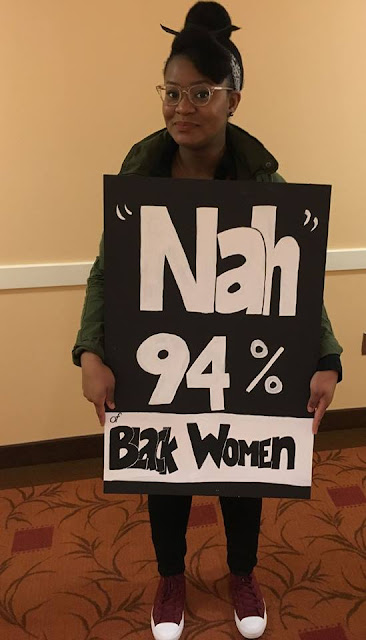When I first heard about the Women's March I thought it was only in D.C. and put it out of my mind thinking I wouldn't be able to attend. As I saw more of my friends outside of D.C. indicating they'd attend it made me look into it more. There were well publicized hiccups as it was getting organized, but once the organizing committee was solidified as well as the mission statement and sister marches were announced I decided to attend here in Boston.
 |
| "This isn't a party, this is people's lives." |
Black and white women's historical relationship is torrid, and this exchange in the Black-ish episode "Lemons" pretty much expressed what I've witnessed most of my life while attending predominantly white institutions including 9 years of single sex schools:
“Why didn’t your sisters turn out for Hillary?” Wanda Sykes’ Daphne asks Lucy, their white colleague. “Well first, white women aren’t ‘sisters.’ We hate each other,” Lucy responds.
There just hasn't been a "sisterhood" evident in the same way I see among black women which has left me wondering what hope is there for a sisterhood between black and white women? And while I know there's more than just the black/white dichotomy, I'm focusing on that here for now as I'm speaking from my experience as a black woman. Saturday, as I approached Boston Common where the marchers were gathering, I took to Facebook Live to briefly share my thoughts on what the day meant to me and why I showed up:
As I rode the train home I was so thankful that I got to experience the Women's March, but I had to wonder:
Hearing directly from white attendees who expressed that they didn't see themselves as part of that 53% and that they highly doubted that's who would show up for the Women's March, although I heard there were a few who did, helped me understand the nuances of the situation. And speaking of data, it still remains true that the majority of voters who showed up overwhelmingly didn't vote for #45. A nearly 3 million difference in the popular vote is unprecedented - the largest margin of a losing presidential candidate - and cannot be ignored. That's why the being visible on Saturday helped send a clear message: what is happening is not representative of the majority.
This leads into one of the common questions I've seen asked since the Women's March, "Now what?"
I've gathered a few resources for next steps/action items:
- Self educate: reading this piece on intersectional feminism is crucial before moving forward; also actually visit the websites of the organization like Women's March and BLM to hear directly from them what they stand for - as I say in my Facebook Live Video as with any large movement/organization, there are factions who can claim to be part of it but that doesn't make them representative of the true principles
- 100 Action for the 1st 100 Days - the official next steps of the Women's March
- Show up: step from behind your screen and activate locally; from volunteering in your community to attending additional marches and events (in my search I just saw BLM holds regular vigils not far from me), seek out events where there is dialogue checking out suggestions on Facebook and Eventbrite as well as this tactic for raising hell for members of congress
- Run for public office: I came across Emily's List and Emerge Massachusetts, as examples of organizations which groom women for public office; even if you don't think you can run, encourage and support those you see on that path and look forward to the mid-term elections to activate the vote in your area
Remember, as this piece on next steps reiterates:
The march shouldn’t be a moment to rest and celebrate. It should be a warm up.
 |
| So much expressed here and this explains the dichotomy perfectly |
And lastly, beware the self-congratulatory sentiment of the Women's March as a peaceful protest.
"White women and white bodies can hold space on streets and shut down cities 'peacefully' because they are allowed to." - Luvvie Ajayi
 |
| Lakeshia Robinson's conflict was palpable in this post about her experience heading to the March |
 |
| Now is the time for some overdue conversations |
"Margaret Meade once said that you should 'never doubt that a small group of thoughtful, committed citizens can change the world.' Despite my reservations I’m attending because I need to believe that she was right."
P.S. Click here to see my recap video of the Boston Women's March.








